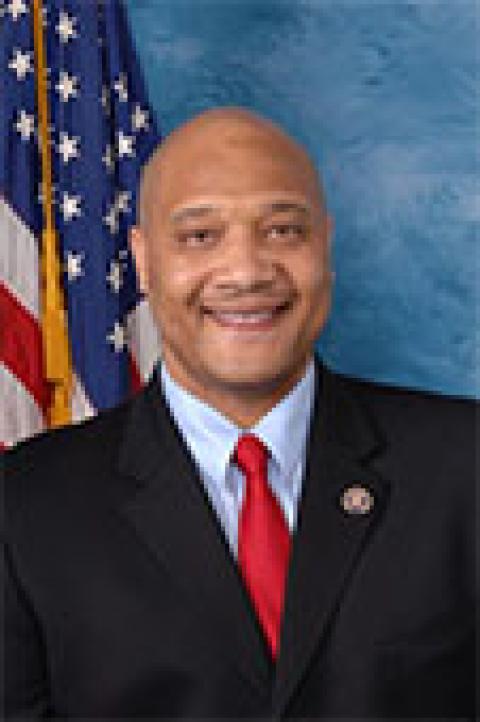Today -- March 1, 2013
A Note from Congressman Carson

Dear Friend:
Today is the day. Sequestration – the indiscriminate, across-the-board spending cuts - is set to take effect today, and still, Speaker Boehner and his allies have refused to compromise or work with the President to avert these unnecessary cuts.
Earlier this week, the White House released a report showing just how sweeping these arbitrary cuts will be, providing yet another reminder that working families all over the country will be the ones to pay the price. Local schoolchildren, hungry seniors, students struggling to pay for college, people looking for a job, women who are the victims of violence, our public safety and health – these are the areas that will be hit the hardest.
In Indiana, sequestration means:
Teachers and Schools: Indiana will lose approximately $13.8 million for primary and secondary education, putting around 190 teacher and aide jobs at risk. In addition, about 12,000 fewer students would be served and approximately 50 fewer schools would receive funding.
Education for Children with Disabilities: Indiana will lose approximately $12.4 million for about 150 teachers, aides, and staff who help children with disabilities.
College Aid and Work-Study Jobs: Around 2,170 fewer low income students in Indiana would receive aid to help them finance the costs of college and around 1,020 fewer students will get work-study jobs that help them pay for college.
Head Start: Head Start and Early Head Start services would be eliminated for approximately 1,000 children in Indiana, reducing access to critical early education.
Military Readiness: In Indiana, approximately 11,000 civilian Department of Defense employees would be furloughed, reducing gross pay by around $64.4 million in total.
Law Enforcement and Public Safety Funds: Indiana will lose about $262,000 in Justice Assistance Grants that support law enforcement, prosecution and courts, crime prevention and education, corrections and community corrections, drug treatment and enforcement, and crime victim and witness initiatives.
Job Search Assistance: Around 24,290 fewer Hoosiers will get the help and skills they need to find employment as Indiana will lose about $683,000 for job search assistance, referral, and placement, meaning.
Child Care: Up to 600 disadvantaged and vulnerable children could lose access to child care, which is also essential for working parents to hold down a job.
Vaccines for Children: In Indiana, around 2,770 fewer children will receive vaccines for diseases such as measles, mumps, rubella, tetanus, whooping cough, influenza, and Hepatitis B due to reduced funding for vaccinations.
Violence Against Women Grants: Indiana could lose up to $138,000 to provide services to victims of domestic violence, resulting in up to 500 fewer victims being served.
Nutrition for Seniors: Indiana would lose approximately $820,000 to help provide meals for seniors.
Protections for Clean Air and Clean Water: Indiana would lose about $3.3 million to ensure clean water and air quality, as well as prevent pollution from pesticides and hazardous waste.
Public Health: Indiana will lose approximately $619,000 to help upgrade its ability to respond to public health threats including infectious diseases, natural disasters, and biological, chemical, nuclear, and radiological events. In addition, Indiana will lose about $1.7 million in grants to help prevent and treat substance abuse, resulting in around 1,100 fewer admissions to substance abuse programs. And the Indiana State Department of Public Health will lose about $146,000 resulting in around 3,700 fewer HIV tests.
Hoosiers cannot afford any further uncertainty, obstruction, and delay. That is why I will continue to pressure House Republicans to take swift action and pass a balanced plan to address these automatic cuts. Too much is at stake.
Best,
André
The Inside Scoop
Passage of the Violence Against Women Act
After months of contention and GOP efforts to weaken the legislation, the Violence Against Women Act has finally passed the U.S. House of Representatives and now makes its way to the President's desk. Congressman Carson joined a bipartisan group of 286 members who voted in favor of the law.
In a statement released after the vote, Congressman Carson said, "Today, the victims of domestic violence, sexual abuse and dating violence were granted the support and protection they so rightly deserve…. All victims of domestic and sexual violence deserve the protections outlined in the VAWA, regardless of immigration status, race or sexual orientation. I'm proud to have supported the VAWA and encouraged that – at least in this case – Congress took steps to thwart discrimination in this country. "
Dedication of the Rosa Parks Statue in the U.S. Capitol
This week, President Obama, Speaker Boehner and Congressional Leaders came together to unveil a statue honoring Rosa Parks and her contributions to the civil rights movement. The special dedication ceremony took place in the U.S. Capitol's Statuary Hall. The President noted that 58 years after refusing to give up her seat on an Alabama city bus, Rosa Parks now takes "her rightful place among those who've shaped the nation's course." The statue of Mrs. Parks portrays her waiting to be arrested on Dec. 1, 1955, and will be permanently displayed in the Capitol Building.
To read more about the dedication ceremony, click here.
In Support of the Voting Rights Act
The Voting Rights Act of 1965 was a landmark piece of national legislation, aiming to guarantee that all Americans would be able to carry out their constitutional right to vote. After so many Americans had difficulty casting their ballots last November, this guarantee has again been proven necessary. Without the protections of the Voting Rights Act, millions of Americans would be at risk of being disenfranchised through restrictive voter ID laws or other efforts to dilute voter turnout.
Congressman John Lewis – an impassioned leader and civil rights icon – offered this week a powerful op-ed in the Washington Post about why we still need the Voting Rights Act. You can read it here.